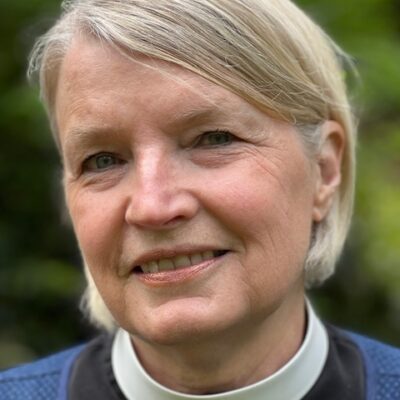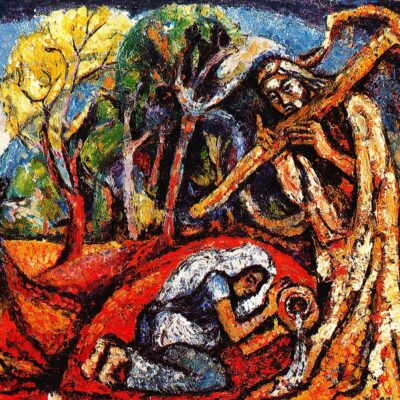Sunday of the Passion : Liturgy of the Palms
Today, Palm Sunday, we commemorate Jesus’ entry into Jerusalem. We mark a moment in a linear journey, cyclically. We return every year to reenact Jesus’ birth, life, death, and resurrection because we know there is something utterly unique and special in this human life.
Every year there is something new to uncover in a life that we also, to varying degrees, know so intimately. We return to the familiar rhythms of the year, connecting, maybe to our own childhoods and how these seasons and days were celebrated.
We connect to our ancestors, the immediate ones we might have known, and the ancient ones that built up our cities, wrote the songs and books we love, and brought the faith from one generation closer to Jesus, to one generation closer to us. Or, we explore this story for the first time, curious how it might shape the linearity, and cyclicality, in our own lives.
Today we read both the entry into Jerusalem, known as the liturgy of the palms; as well as Jesus’ trial and death, known as the liturgy of the passion. In preparing for this sermon, I thought that since we’re going to fully commemorate those later parts of the story on Good Friday, I’d like to focus mainly on Jesus’ entry into Jerusalem, deferring, like a good seminarian, to Rt. Reverend LaBelle to preach on the trial and crucifixion.
Because today, I, being yet young in the faith, want to begin an inquiry by asking just a simple question: What does it mean that Jesus knows there will be a colt tied up in the village ahead of them?
Is this knowledge to be thought a minor miracle? That he knew there’d be a colt, and that its owner would relinquish it seemingly without contest?
Is it to build up our perception of his omniscience, which we inevitably then hold at a bit of distance, that the way he knows things is a way of knowing things that is impossible for us?
I think I’m already giving away how I answer those questions: I don’t think it’s for any of those purposes.
Have you ever been with a serious birder, who is able to spot birds, and certain features of their wings or their beaks, that to you or I, are invisible? Or to a baseball game, or really any sporting event, with someone who really knows the game, and can interpret the reasons behind all of the movements? Or with an expert of any type, be it of high-mountain Taiwanese teas, the subtleties of motorcycle carburetors, or even of the memes on TikTok; I know, at least, that there is great subtlety in the world, and for anyone who pays attention, over a period of time, a great gap will open up between that person’s knowledge and the rest of us.
Once I began thinking about this, I couldn’t stop asking myself, “What do I know?” Lacking any divine ways of knowing, “What do I nevertheless know?”
“What do you know?” Lacking any divine ways of knowing, “What do you, nevertheless, know?”
We know — that Jesus is a very perceptive observer, maybe the most perceptive. Had they passed by this town earlier, even much earlier, and did he note, and remember, that there was a colt? Or, does he know of the colt by merely knowing what type of town it was up ahead, and the age in which he lives, knowing that every town of that type will have any number of donkeys, and will inevitably have a colt tied up, as described? Now, my goal of asking these questions isn’t to bring Jesus down to mere humanity; Luke doesn’t say how Jesus knows about the colt, or why the owner would relinquish it, so we don’t need to seek after certainty where there isn’t any provided. Rather, do we, mere humans, but made in the image of God, also possess some capacity for keen perception, and knowledge?
Yes, we do, I suppose as already described above about birding and baseball, and Taiwanese tea. But then, more than that, or more subtle than that: Do we know, that when we show up to church on Sunday morning, that there will be someone here who will benefit from a bit of extra presence? Do we know that when a person sings the hymns with a bit more courage, it helps other people sing with a bit more courage? Do we know how powerful listening can be?
We are capable of paying attention, and we are capable of knowing things, about the workings of the world, and about the workings of human heart. And we can act on those things that we know, which is obviously the harder part. Particularly when we get to knowing and acting on more difficult, and painful, knowledge.
For it is not merely a tied-up colt that Jesus knows about, or, later in the Gospel, that there will be an upper room available where he and the disciples can celebrate the Passover meal. He also knows what awaits him in Jerusalem.
This entry into Jerusalem is often called the “triumphal entry into Jerusalem,” as “the whole multitude of the disciples began to praise God joyfully with a loud voice for all the deeds of power that they had seen.” And if the crowd were forced to be silent, that even the stones would shout out. The Kingdom of God is here, so irrefutably, that even a stone, with very limited capacity for observation and knowledge, can perceive and would respond.
It’s triumphal, and the crowd who knows him lays down their cloaks, and gathers leafy branches—palms—to mark his path. But we also know, either by the repetition of this narrative cycle over many years, or by just a few minutes ago hearing the rest of the gospel reading for the first time, what happens at the end of this week. Jesus knows also what awaits him, and goes forward anyway. From Palm Sunday it really might seem like Holy Week, but not in any way that the crowd could imaginably envision.
According to Marcus Borg and Dominic Crossan, through their research and deductive imagination, in their book The Last Week, Jesus also knows that he is not the only one entering Jerusalem that day. On the other side of the city, Pontius Pilate, the governor of the region, entered Jerusalem as well. He came at the head of an army, with all the pomp and violent strength that that brings. According to their research, it was well-known and common for the Roman governors to be in Jerusalem for the major Jewish festivals, when many Jewish pilgrims would fill the city. Pilate and an army wouldn’t come for the sake of reverence, of course,
but to make sure that as the Jewish people celebrated their liberation from Egypt, they remembered who was in charge in Judea and Israel.
So, opposite this imperial show of force, to insure the continued Roman domination of the Jewish people, Jesus exemplifies an alternative. He rides in on a humble donkey, bringing to the crowd’s mind the prophet Zechariah, who prophesied that the king who would bring peace to the world would enter Jerusalem on a young donkey, a colt. The crowd who praised him knew of his deeds of power, and by extension, his teaching and ministry. That Jesus healed the sick, fed the masses, raised the dead, and always, always affirmed the dignity of the poor, the marginalized, and the stranger. The Kingdom that Jesus triumphantly heralded, the Kingdom of God, was not another form of imperial domination, but was the belief, radical then as it is now, in a God of grace, from whom flows justice and dignity for all. That the offer of God’s love is available to all people, at all times, and that bonds of love are the strongest form of human relationship. To give is to receive; to forgive, is to be forgiven, and the meek will inherit the Earth.
Borg and Crossan mention that the word “belief,” in the early church, brought to mind “trust” and “commitment,” not merely thinking or claiming that “a set of statements or doctrines are true.” To believe in the Kingdom of God meant to trust in that Kingdom; to give oneself over to the love that rules that Kingdom. A person could not know the Kingdom, believe in the Kingdom in any meaningful way, if it didn’t affect that person’s life.
This is no longer the knowledge of the expert birder, who can distinguish between the songs of various sparrows, or the flight pattern of various swallows. This is knowledge that is gained by the observations of a soft heart, by conversation with a friend in pain and by being in pain oneself; by loss, joy, and difficulty; by poems, books, and movies; by contemplation, and prayer, and by what we’re doing today, I hope: study and consideration of the life of Jesus. It is a knowledge that forms what we believe, and it is belief that if we were to bring it fully into the world, we could justifiably claim it as knowledge. It is knowledge that is informed by faith.
It is important to figure out what we claim to be most true, because it will eventually be tested. Even Jesus will have a moment of uncertainty, knowing that the beliefs he teaches and enacts will run crosswise against the beliefs that undergird Empire. In a quiet moment of prayer, before he is arrested, he’ll ask, “Father, if you are willing, remove this cup from me.” But then continues: “yet, not my will but yours be done.” What is described as an angel from heaven then appears to him, and grants him strength, so that he might continue, to bring his ministry of love to its fullness.
We’ll get, God willing, many times to ask ourselves these questions about what we know about God, and what we really believe to be true. Now, maybe once I stop talking; during coffee hour; anytime you or I open the Bible; anytime you or I come to church and hear Canon Britt preach; anytime you or I withdraw from the crowd about a stone’s throw, kneel down, and pray. The season of Lent will soon be over. The palms of today will soon be three hundred and some days away from being burned and made into ash, that we will then have marked on our foreheads in the sign of the cross. We’ll soon enact the joyous conclusion to this story.
In this yearly rhythm, we are like the Earth, circling the Sun, being circled by the moon. Every now and then, the moon comes to a place in its imperfectly elliptical orbit, when the moon is closer to Earth than it normally is. And sometimes this closeness to Earth coincides with a full moon. This is a supermoon, a bit bigger than the “merely” full moon last night. You can go outside, look East at sunset, and as long as it’s clear, see an incredible moonrise.
Holy Week is an opportunity to look at something rare and beautiful. Unlike the moon, also heartbreaking and challenging. Every year, we can come back around for this close look at what it means to give oneself to God, when the radical life of Christ is a little more vivid, and what’s at stake in living the life of Christ is a little clearer. At some point, you’ll want to find a perch on Queen Anne looking east, or better yet, drive out to Yakima where I’m from, and watch the moon rise over the open space of the desert. Maybe this is the year, maybe not. You know how close to the story you are able to get this year.
What do we know? What are we willing to risk?





Leave a Reply